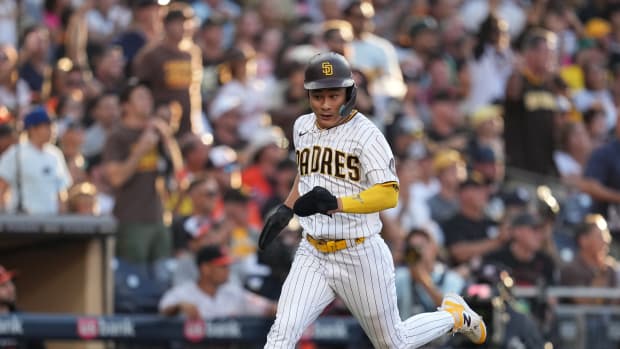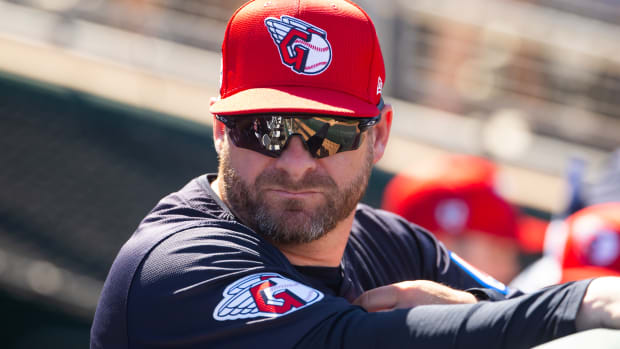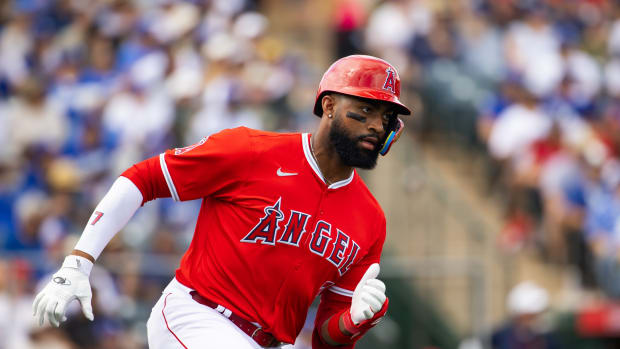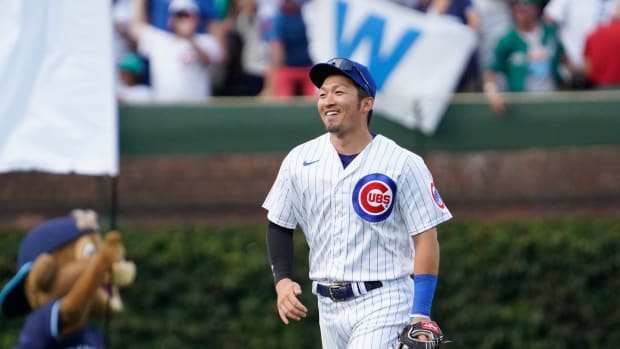MLB Rule Changes Roundtable: What Does Having a Three-Batter Minimum Accomplish Anyway?
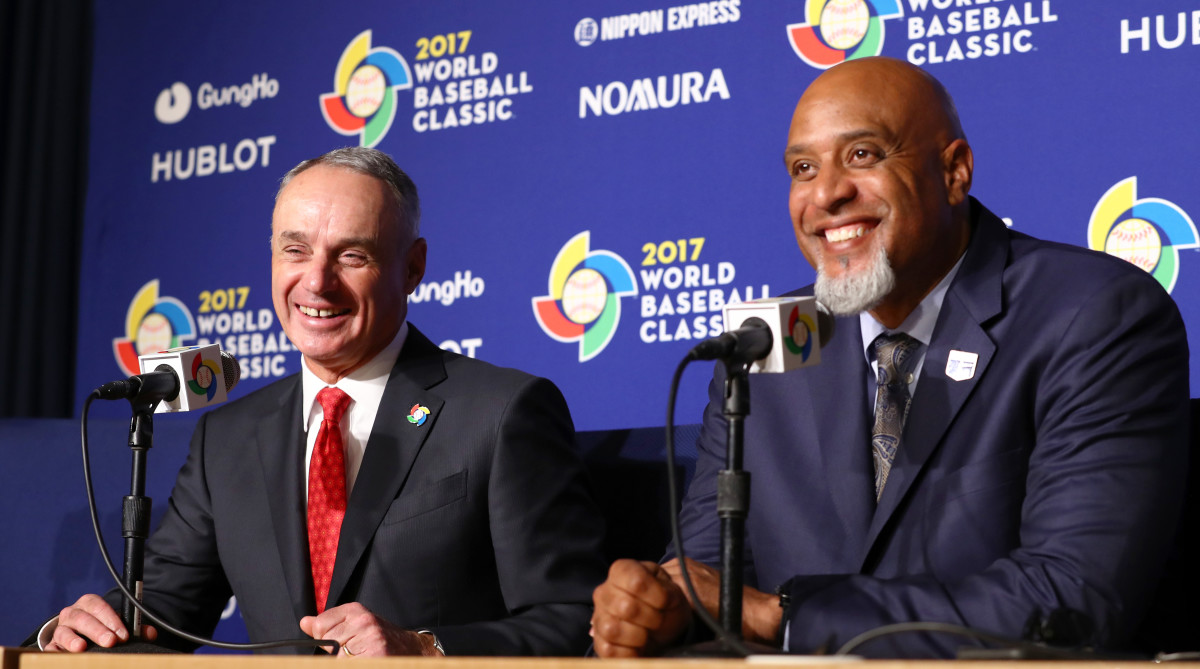
Change is coming to Major League Baseball, a game that faces the perpetual battle between tradition and modernization more than any other professional sport. On Thursday, MLB and the MLB Players’ Association announced a slew of new rules that will be implemented over the next two seasons. Naturally, these changes received mixed reviews. For this roundtable, members of the SI MLB Staff reveal what they think of the new rules.
Mitch Goldich:
Baseball in July changes: I’m a big fan of the new Election Day for the All-Star Game, largely because I really disliked the old format. There were obvious problems with the old system of drawing out the voting for months (in 2016 voting literally started on April 24)—among them, let’s see, often picking the wrong players—but I always felt like MLB turned the exercise into a gross ploy for web traffic and social reach.
I haven’t voted in years, and the year I finally quit doing so it was because people could vote up to 25 times on MLB.com (why?), and each time had to manually deselect the box asking them to subscribe to a newsletter (oh that’s why). MLB is not alone here, as the NBA has had days where tweets count double. *John Oliver voice*: Cool.
I swear, I’m not normally this cynical or negative, and I absolutely understand the importance of fan outreach and engagement. MLB needs to market its stars, it ought to get fans excited about players and talking about them on social media, etc., etc.
Let’s do it all on one night, which will help get the right players in and might actually help generate the buzz. Count me in. It’s better than what we’ve done before.
You know what, I feel better already.
New trade deadline: One of the first in-depth pieces I read about the new rule changes came from The Athletic’s Ken Rosenthal on Wednesday. He wrote about some potentially unintended consequences, and how it might be difficult for a team in contention to fill a hole on its roster if the team suffers an injury or two after July 31.
My initial reaction is that this is yet another reason for the increasing emphasis on positional flexibility. Where will the Brewers find a second baseman if Mike Moustakas gets hurt and they don’t want to call up Keston Hiura? (Rosenthal’s example.) How about on their own roster? We are rapidly reaching the point where teams want every guy on the roster to capably play three, four, five positions. Here’s yet another reason why that will come in handy.
If anyone can play second base, it becomes easier to simply call up the best player available from the minors, insert the best player available from the bench into your lineup and let that whole defense thing just kinda work itself out. Kids, buy lots of gloves.
Jon Tayler:
Three-batter minimum: More important than this rule coming into existence is how it came about: with the union more or less grudgingly accepting its arrival in exchange for other concessions. That may pay off down the road, but it’s easy to see why this rule stings them, affecting relievers as it does. We won’t see it until 2020, which is for the best, as a few details—namely, how to handle injuries and poor performance within the boundaries of the rule—remain frustratingly vague. Still, though, it shouldn’t be too big an issue ultimately: Few relievers even purposefully face fewer than three batters at this point.
Roster size changes: Adding a permanent 26th man is a good thing with modern bullpens bloated, especially with an adjacent limit on how many pitchers a team can carry. Benches have become too thin as relief corps have swollen, and this should restore some balance. Smaller September rosters are a good thing, too, though I wish the league had kept the size at 40 but forced teams to designate an active 28. September baseball may be meaningless for many, but those call-ups matter a lot to prospects and minor league veterans both.
One trade deadline: This is a solution that doesn’t fix the problem the union thinks it will. One deadline isn’t going to spur teams to do more in the winter so as to bolster teams earlier; the reasons for the free-agent slowdown are deeper and more economics-based than that. Count me as someone who liked the August waiver deadline for its propensity to add late chaos and provide vital boosts to contending clubs late. Making everyone finish their shopping list before they’ve picked out a recipe seems kind of silly.
All-Star stuff: A Home Run Derby bonus can’t hurt, particularly given that $1 million isn’t chump change for a lot of young players (it’s over twice what Aaron Judge made in the season, for instance, when he won his derby in Miami). Election Day is equally financially driven, but in the league’s favor: More voting means more website clicks and social media interaction, which further gooses MLB’s bottom line.
Emma Baccellieri:
Three-Batter Minimum: I think the overall effect here will be fairly minimal; recent seasons haven't had that many pitching changes happening after one or two batters but before the end of the inning. But it does mean that it's time to pour one out for one of my favorite niche strategic baseball moves with questionable value (big category there)—the Waxahachie Swap, when a pitcher is sent to the outfield for one batter only to be brought back to the mound immediately after, a way of retaining the platoon advantage without having to lose a pitcher for the rest of the game. Common? No. Beneficial? Maybe. Fun? So much. RIP.
Limit on Position Players Pitching: My big question here is what's going to happen to Shohei Ohtani. It seems absurd that the two-way designation wouldn't apply to the single most popular and effective two-way player. But given that there's no exemption for injury written into the rule, at least as it's been publicized so far, what happens if he's unable to pitch at all this year while recovering from Tommy John? That shouldn't automatically write him off for 2020, too, and yet there isn't a clear way around that in the language of the rule! I imagine that something will fix that up, either an allowance for injury or one specifically written for Ohtani. As of right now, though, it's unclear.
Home Run Derby: The derby already got decidedly more fun with the timed format unveiled a few years ago, and this should only help. It should figure to be mostly young players; $1 million is double the annual salary for most players before arbitration, and, well, that's a problem in and of itself ... but in terms of providing a clear incentive for baseball's best young talent to participate in an event that's already full of style and flash, it's great.
All-Star Election: This seems like it can be fun, in the same vein as players' weekend, encouraging guys to show off their personalities and indulge in some playful rivalries. But I'd really like to see something taking these ideas a step further—a player draft, à la the NBA. Why not? The All-Star Game no longer decides home field advantage for the World Series, which means that it no longer has to be taken too seriously. With all the hand-wringing about fan appeal and player marketing and the next face of baseball, it seems like too good a chance to pass up.
































